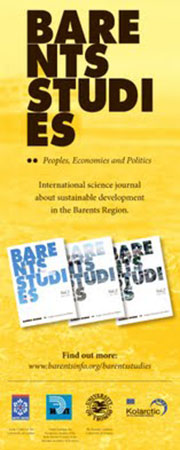I have been a member of the Northern Political Economy group since January 2013. Unlike most of the group members, I am not a researcher but my job is to coordinate one of our international cooperation projects. The objective of the project I’m working for is no more and no less than to establish a new academic journal - Barents Studies: Peoples, Economies and Politics.
 Different kinds of projects have become part of everyday life also in universities and some consider it more positive trend than others. A good project is well planned, effectively managed and most importantly needed in the first place. From our perspective the situation was clear. The interest towards the Barents Region is growing and research based information is needed both inside and outside the region. So far there have not been any academic journals available concentrating on the various developments of the region. So the need and challenge were there, and this time luckily also a funding instrument was available. Kolarctic ENPI CBC Programme granted two years funding for the project consortium and the first issue of Barents Studies: Peoples, Economies and Politics is to be published in October 2013.
Different kinds of projects have become part of everyday life also in universities and some consider it more positive trend than others. A good project is well planned, effectively managed and most importantly needed in the first place. From our perspective the situation was clear. The interest towards the Barents Region is growing and research based information is needed both inside and outside the region. So far there have not been any academic journals available concentrating on the various developments of the region. So the need and challenge were there, and this time luckily also a funding instrument was available. Kolarctic ENPI CBC Programme granted two years funding for the project consortium and the first issue of Barents Studies: Peoples, Economies and Politics is to be published in October 2013.
My work as a coordinator is interestingly somewhere between academia and administration. The basic idea is to serve researchers, students and other interested readers by distributing new research information about sustainable development in the Barents Region. My daily work involves mainly communication in various directions, some financial management, meeting and travel arrangements, cooperation with layout designers, printing companies, language consultants, information specialists and it also includes a lot of finding out of things. As said, we are doing this for the very first time so there are also many new questions to be answered.
All different stages in the preparing process of the journal are important but the most important work is still done by the researchers who submit their articles to us. Without content the journal simply does not exist. Maybe my work could be described as working behind the scenes. It is about enabling the research information to find its readers and increasing awareness regarding the Barents Region.
My educational background is in IR and since finishing my master’s studies in 2008 I have worked with various kinds of national and international development projects in the higher education sector. This two-year project is especially interesting because it comes close to my original field of studies. I’m especially excited that this project has real potential to provide lasting results and really contribute to the original challenge.
Project partners:
· Arctic Centre at the University of Lapland (Lead Partner, Finland)
· The Luzin Institute for Economic Studies of the Kola Science Centre of the Russian Academy of Sciences (Russia)
· The Barents Institute at the University of Tromsø (Norway)
More information: www.barentsinfo.org/barentsstudies
Text by Anne Raja-Hanhela